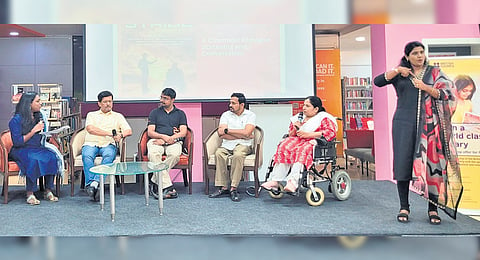

CHENNAI: Films try to emulate the realities, and quite often they mirror the society’s flaws and imperfections like a perfect painting. The dialogues and the plot tend to influence our narratives and perspectives. To bring in a language of inclusion, it is important to tell stories through the characters’ lens. The question ‘who is telling the story’ is a crucial tangent to understand — it is important to take accountability, it is important to present and represent a raw picture of reality — be it the subject of gender, caste, class, disability, etc.
Holding conversations on representation and inclusion, and to explore stories of perseverance, identity, and sportsmanship, on Friday, at the British Council, Chennai, YWTC (Yes, We Too Can!!!) Charitable Trust hosted ‘A Cinematic Dialogue’, an event dedicated to amplifying the voices of persons with disabilities through film. With a focus on inclusion and accessibility, the gathering brought together filmmakers, activists, and an engaged audience.
The event featured the screening of two films: Stride and Beyond the Court: The Indian Wheelchair Basketball Journey. Both films were produced by participants of YWTC’s filmmaking course, supported by Fiserv Gives Back (a corporate citizenship programme) , and aimed to create awareness and encourage deeper conversations about the intersection of disability, identity, and sports.
Powerful narratives
Stride addressed the sensitive issue of intersectionality, focusing on the complexities faced by persons with disabilities who also grapple with societal stigma related to sexual identity. The film portrayed the inner turmoil and the external barriers that often prevent individuals from expressing their true selves. The narrative struck a chord with the audience, offering a glimpse into the challenges of finding support while living at the intersection of multiple marginalised identities.
The second film, Beyond the Court, chronicled the journey of wheelchair basketball in India, showcasing the determination and passion of its players. The documentary wasn’t just about basketball; it was about breaking barriers and redefining perceptions of disability through sport. The film’s raw, unfiltered approach gave the audience a closer look at the daily struggles and triumphs of these athletes as they fight not only for success on the court but for inclusion off it.
Krishna Satyam, who served as the cinematographer for Beyond the Court, reflected on how the project transformed his understanding of inclusion. Having started his photography journey in 2019, Krishna came into the project with a fresh perspective but little prior knowledge about accessibility. “Before, I was just a normal individual — I didn’t know what inclusion or accessibility meant.
But when I got this opportunity, I got exposed to a whole new world, especially through the lens of wheelchair basketball. Slowly, I began to understand what inclusion actually is. I work in a US-based consultancy, and I realised how true inclusion involves making spaces fully accessible. They build ramps, accessible washrooms — these are things I learned to appreciate through this project,” he said.
He also shared the unique challenges he faced while working on the film, and said, “This was my first documentary, and I wasn’t familiar with how to depict the dynamics of wheelchair basketball on screen. The challenge was showing the action and emotion of the game without making it feel artificial. That’s why I avoided using typical lighting setups — I wanted the footage to feel rustic and real.
Another challenge was working with people with disabilities in a way that was not only respectful but also collaborative. We gave a 100% opportunity to a person with disabilities to work as a cinematographer with us. Although communication was initially tough, we found a connection through our shared passion. Most of the frames were a collaboration between us.”
Vision for an inclusive world
The driving force behind both the films and YWTC’s broader mission is Madhavi Latha, an inclusion advocate and the founder of the Wheelchair Basketball Federation of India. As a former National Para Swimming Champion, Madhavi has firsthand experience of the barriers that persons with disabilities face, both in sports and in life.
Speaking about the significance of the event, Madhavi highlighted the importance of creating spaces where people with disabilities are not only represented but are also the ones telling their own stories. Through YWTC’s initiatives, she aims to break down the stereotypes and limitations placed on persons with disabilities.
“We want to give them a platform to showcase their talents, whether it’s through sports, filmmaking, or other creative fields,” Madhavi explained. “Our goal is to ensure that people with disabilities are seen as equal participants in all aspects of society.”
The panel discussion following the screenings was a reminder that inclusion is not just a buzzword — it’s a call to action. The films made by YWTC not only opened the eyes of many in the room but also showcased the potential of cinema as a medium for social change. By giving individuals the tools to tell their own stories, YWTC is fostering a new generation of filmmakers and advocates who can inspire others to see the world from a different perspective. Cinematic Dialogue was a celebration of resilience, creativity, and, most definitely, reiterating the importance of inclusion.